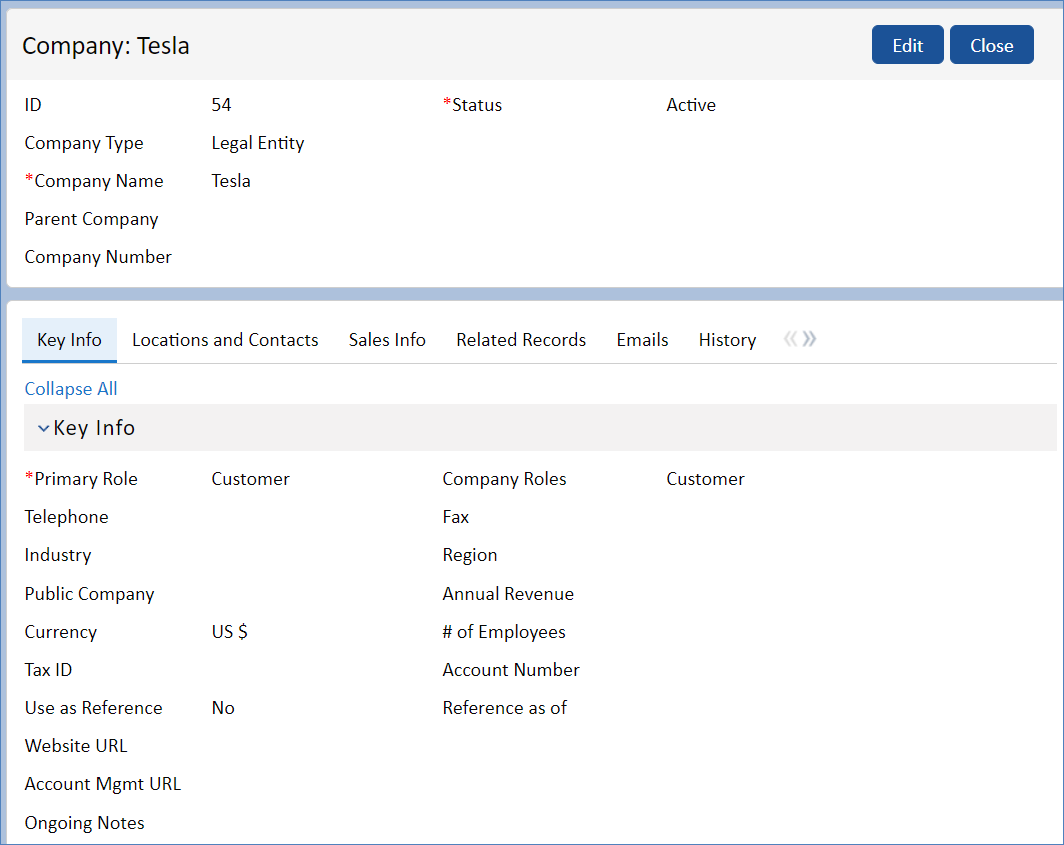...
- Key Info: holds contact information, basic financial information, some representative information of the company, and goods and services provided by Suppliers.
- Locations and Contacts: contains embedded tables for Location and Contact records that relate to the company.
- Sales Info: contains embedded tables for Opportunity, Quote, and Purchase Order records that relate to the company.
- Related Records: contains embedded tables for Support Case, Contract, Insurance Certificate, Assets, and other records that relate to the company.
- Supplier Information: becomes visible if the company's Primary Role is Supplier. Contains Supplier Onboarding Information, Supplier Profile(s) list, Related Supplier Companies, Supplier Stakeholders, Supplier Responses to Sourcing Events, Supplier Insurance Coverage, Supplier Performance Evaluations and Performance Scores.
Use Case
Company records can be created in a variety of ways:
- Passively, via the Company Name field, whenever a new record gets created in the Leads table
- By members of the Admin, Admin Import, Business Admin, Contract Creator, Contract Manager, Contract Owner, Contract Requester, Marketing, Project Manager, and Sales groups directly in the Companies table
- Directly in the Contract Party Information section of a new Contract record: by clicking the New Company radio button, filling in the necessary information, and clicking Create Company
- Via the supplier onboarding module. Either triggered manually by a supplier manager, or created automatically when a supplier profile is approved.
...
- Creation for all companies: This rule runs when a company is created from any source. It sets the Company Roles to the Primary Role.
- Create: Supplier Profile Source Actions: This rule runs when a company is created from a Supplier Profile. There are two ways a company can be created from a Supplier Profile:
- The Supplier Manager clicks the 'Create Company' button.
- The Supplier Profile is approved. This rule copies the Source Supplier Profile ID to the Latest Supplier Profile ID. If the Source Supplier Profile is not Approved, it sets the Company's status to Pending. Finally, it performs linked record actions on the Source Supplier Profile and all Supplier Related Companies, Supplier Stakeholders, and Company Documents to update their Company ID to the new Company's ID.
- Create: Contract Source Actions (web, API): This rule runs whenever a new Company record is created from within a Contract record using the 'Create New Company' option. It consists of two actions: L: Set Company ID in source contract and U: Set Company Roles. L: Set Company ID in source contract is a Linked Field action that links the ID field in a Company record to the Company ID field in a related Contract record, and U: Set Company Roles is an Update action that updates the Company Roles field with the Company Type.
- Create: Sourcing Event Source Actions: This rule runs when a company is created from within a Sourcing Event. It sets the Status of the company to Pending. This rule only runs if the Supplier Management function is enabled.
- Create: Supplier Response Source Actions: This rule runs when a company is created from within a Supplier Response. It sets the Supplier ID in Supplier Response to this Company's ID. Additionally, if the Supplier Management function is enabled, it sets the Status to Pending.
- Edit: Contract Source Actions (web, API): This rule runs whenever a Contract Source ID field has been edited and changed to a non-zero value. It consists of a Linked Field action called L: Set Company ID in source contract.
- TB: Notify about expiring insurance certificates (disabled): This time-based rule runs every other day at 3 AM, and contains an action called E: Email Contract Owner Manager of Upcoming Insurance Cert Expiration. This action uses a saved search to check if any active or in-progress Insurance Certificates records are set to expire within 14 days, and then emails the Contract Owner Manager with results. This rule is comes disabled by default.
- TB Demo Data Update: This time-based rule runs once every month, updates Demo Date fields, and deletes History. It consists of two actions: "U: Update Demo Dates' and "D: Delete History for TB: Demo Data Update." "U: Update Demo Dates" is an Update action that replaces the Date Created, Date Updated, Original Start Date, and Reference As Of fields with a date one month in the future. "D: Delete History for TB: Demo Data Update" is a Delete action that deletes history entries that are created after "U: Update Demo Dates" updates the designated fields. This is a good example of ensuring that the actions in your rules are added in proper order, otherwise, the Delete action would have nothing to delete.
...
